Physical Address
304 North Cardinal St.
Dorchester Center, MA 02124
Physical Address
304 North Cardinal St.
Dorchester Center, MA 02124
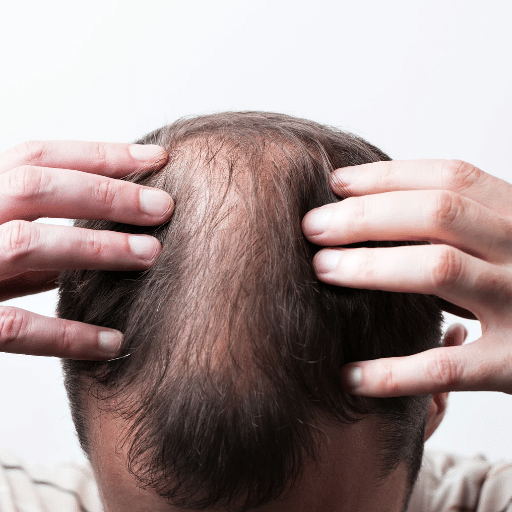
Do you grapple with thinning hair or hair loss and look for a product of nature to bring your hair dry and listless back to life? It may appear as if the hair will only grow naturally again after passing through the rigorous process, but through the method of the left, you can witness the best results in only three weeks. This article is everything you need to know about the signals of hair growth being sent through the veins of your scalp, strength being sown in your roots and the growth of healthy, luscious hair getting ready to happen. Not only will consuming nutrient-rich foods and oils, practicing stress management methods, and changing your hair care habits for the better be taken into consideration, but we will also show you how easy and effective it is to transition to healthy and shiny hair with some different lifestyle tips. So, no more guesswork ahead through hair growth, get prepared to have a total turnaround in your assurance and confidence through hair growth naturally!
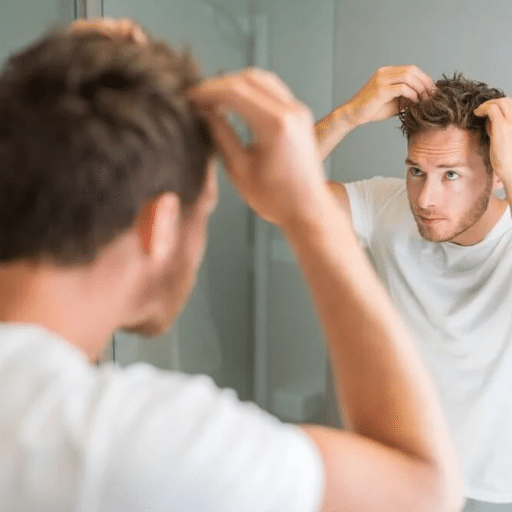
Hair growth is a natural process that occurs in cycles, consisting of three main phases: anagen (growth), catagen (transition), and telogen (resting) phases. In the anagen phase, the hair is actually growing, a process that might go on for 2 to 7 years, depending on genetics and general health. The catagen phase refers to the brief period where the hair stops growing and the follicle starts to retract. Eventually, during the telogen phase, the hair, which is at rest, is shed, allowing new growth to begin in its place. A combination of a good diet, adequate water intake, and stress management is a measure that would result in well-balanced hair growth. It is also necessary to identify the sources of and take in biotin, zinc, iron, and vitamins A, C, D, and E as part of a person’s diet to maintain hair health. Frequent cleaning, massaging, and the use of appropriate hair products for the scalp make hair follicles one of the people’s best assets: healthy and eager to promote growth.
There are many reasons why the hair growth cycle changes, including age, genetics, hormones, and general health. For instance, if there is a hormonal issue during pregnancy or menopause, then the stages of the cycle might be affected in terms of how long they last. Likewise, health problems such as androgenetic alopecia or telogen effluvium may cause the hair to look sparser or fall out excessively, as they result in variations in hair growth patterns. Proper nutrition, scalp care, and stress management are among the evidence-based practices essential for a strong and balanced hair growth cycle. By the same token, people with severe hair issues may find medical treatments or hair care innovations to be critical tools for support.
A host of contributing factors, including genetics, lifestyles, and health, can work together to cause hair loss. In general, one of the top reasons is androgenic alopecia, an inherited condition found in both males and females that leads to the gradual thinning of hair. Hormonal variations, such as those due to pregnancy, menopause, or thyroid disease, can disrupt the hair growth cycle, leading to more shedding.
Among the root causes of hair loss, deficiencies in iron, vitamin D, and protein are common issues that people may also suffer from due to modern living. The lack of these three essential building blocks of hair can lead to hair loss. The two forms of stress, physiological and mental, can trigger telogen effluvium, whereby one loses hair temporarily and all at once. Medications like those used in chemotherapy or for high blood pressure treatment can also be the reason for hair loss.
In addition to that, autoimmune diseases like Alopecia Areata, where the immune system mistakenly attacks hair follicles, and conditions such as psoriasis, scalp infections, and others, can result in poor scalp health. On the other hand, the balance between and synergistic influence of environmental and lifestyle factors, such as consistently being in polluted environments, smoking, and applying heavy chemical treatments to one’s scalp, as well as heat styling, can also lead to hair thinning and breakage over time. Therefore, knowing the reasons for hair loss is extremely important for selecting the proper treatment and preventive measures.
Natural hair regrowth significantly impacts not only outward appearance but also the mind and spirit, restoring confidence and emotional stability. In contrast to artificial substitutes or surgery, natural regrowth utilizes the innate power of the body to build up and rejuvenate hair follicles gradually. The ways to do so include, among other things, a balanced diet rich in biotin and vitamins, regular scalp massages to improve blood flow, and the use of plant-derived or mild chemicals to facilitate and support the process. Research has it that by using constituents like aloe vera, rosemary oil, and saw palmetto in the hair care product,s it is possible to promote the growth as well as the general condition of the scalp. By initiating the natural processes of hair regrowth, people can achieve permanent outcomes that align with their hair health objectives in the long term.
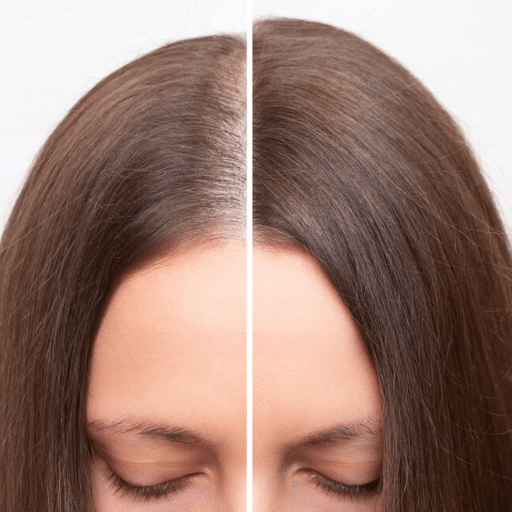
Hair health and natural hair growth can be dramatically improved by introducing a few significant lifestyle changes. Initially, it is essential to follow a nutrient-packed, vitamin and mineral-rich diet. This includes biotin, zinc, iron, and vitamins A, D, and E, which are suitable for high-quality and potent hair growth. Including protein sources like eggs, fish, and beans in the daily diet is ideal since hair is a product of keratin, a protein. Furthermore, not smoking and eventually cutting down the consumption of alcohol will be a part of the lifestyle since both of them might be detrimental to the hair follicles and the circulation of the blood to the scalp.
By the way, the next one in line is good sleep, where the quality of your hair growth rate becomes your health’s leading indicator. The human body works best when it is at rest and is most relaxed. Therefore, it needs 7-9 hours of uninterrupted sleep, as recommended by medical research. Understanding the body’s natural cycle, which involves repair and regeneration, helps keep follicles healthy. Water is of the utmost necessity, and your solution lies in drinking enough water daily. This ensures the scalp is hydrated, preventing drying that may impair hair growth.
In conclusion, exercise is the basic key to good circulation and therefore decreases the level of stress hormone, which indirectly helps hair regrowth. Brisk walking, yoga, and weight training are among the activities that improve the blood flow to the scalp and feed the follicles. As long as you maintain these lifestyle changes, you will see a better foundation for hair growth being formed, and the rest is straightforward.
It is highly probable that, in the same manner, applying the appropriate essential oils, namely rosemary, peppermint, and lavender, one can achieve stimulation of the hair follicles and substantially improve scalp health as well through regular massages. Also, the plant aloe vera is becoming very popular for its soothing and nourishing properties, which help reduce scalp inflammation and improve hair strength.
Apart from the above [framework], investing in nutrient-rich ingredients is an efficient way to strengthen and grow hair. Natural products like onion juice, known for its sulfur content, and green tea, a powerful source of antioxidants, have both shown potential for improving hair growth. On top of that, regularly detoxing the scalp with natural exfoliants, like coffee powder or sugar, will eliminate dirt and other substances, improve blood circulation, and create a perfect setting for hair growth.
If you take a more holistic approach and apply these treatments, your diet will simultaneously support vitamins such as Biotin, Vitamin D, and antioxidants. The state-of-the-art and environmentally friendly remedies being increasingly used are scientifically and otherwise proven to be the best ways to nurture and promote hair growth in the long term.

By gently rubbing the scalp with natural oils, like coconut or castor oil, one can possibly energize the follicles to produce hair better, and also improve the circulation of blood there. Eventually, this activity will lead to the promotion of healthier hair growth.
The use of essential oils like rosemary, peppermint, or lavender has been associated with denser hair and faster growth. Combine some drops with a carrier oil and place them directly on the scalp for the best results.
Aloe vera is one marvelous plant with excellent hair-mending abilities that can be used topically. The cactus-like plant can be grown in your home, containers, or gardens. Once applied to the scalp, it reduces dandruff, unclogs hair follicles, and thus aids in new hair growth.
Already established to be effective in promoting increased blood circulation to the hair follicles as well as stimulating keratin production, onion juice is sulfur-rich. To depoly, squeeze newly harvested juice and perform a massage on the scalp, then wash it off.
Eat foods that are rich in vitamins such as biotin, vitamin E, and zinc, which in turn enhance the skin’s power and resistance. A person can try to incorporate nuts, seeds, leafy greens, and eggs into their diet naturally for the best results.
Limit the use of harsh chemical shampoos and styling tools to a minimum. Vitamin biotin, vitamin E, and zinc are among the vitamins found in such types of shampoos, and if one eats plenty of nuts, seeds, and leafy greens.
Throughout the years, coconut oil has been recognized mainly for its extraordinary ability to nourish and care for hair, which explains why it is widely used in hair care regimens. Containing fatty acids and vitamins, coconut oil can penetrate the hair and reduce protein loss, thereby making the hair healthier and shinier. It has been observed that its antibacterial attributes significantly help in eliminating dandruff and scalp irritation. It becomes very clear that with the proper application of coconut oil, hair problems such as lack of moisture and split ends can be avoided while the hair is being beautified. Therefore, coconut oil is a readily available and effective natural hair treatment. Whether used as a pre-wash treatment, conditioner, or leave-in product, coconut oil remains an indispensable ingredient in the quest for strong and healthy hair.
Over the past few years, rosemary oil has become extremely popular because of the various benefits it offers, particularly in hair care and general health. Folks out there know about the splendid advantage it gives in actually achieving hair growth, which is why they always opt for rosemary oils. This is essentially due to the improved blood circulation in the scalp from using rosemary oil, which ultimately leads to hair follicles creating denser and thicker strands. Not only this, but its antioxidants make it easy to combat free radicals, thereby lessening the harm to hair and scalp tissues. In addition to this, rosemary oil is a great anti-inflammatory and has been proven to impact dandruff when used topically. There is also the matter of gray hair and hair loss, for which rosemary oil is believed to have the potential for prevention and effective treatment. Even though it may be in the form of carrier oils or shampoos and conditioners, rosemary oil will always be a favorite natural product for people who are aiming for healthier and shinier hair, and ultimately see the results.
Different types of hair masks deliver nourishment and hydration to the deep layers of the hair, addressing dryness and damage, and restoring the hair’s original glossy and rich natural health. These types of therapy primarily contain a mix of natural oils, proteins, and vitamins that can penetrate the hair shaft, strengthening it and making it elastic. Ingredients like argan oil, avocado, honey, and banana are top-rated due to their rich nutrients. For example, argan oil is recognized for its significant amounts of fatty acids and vitamin E, which are responsible for restoring moisture and shine. Similarly, potassium from bananas and vitamins would only be beneficial in strengthening your hair and making it easier to manage. With a hair mask, you can, to say the least, monitor and enjoy your hair’s breakage-free, frizz-free, and touchably soft looks once or twice a week, within a few months.
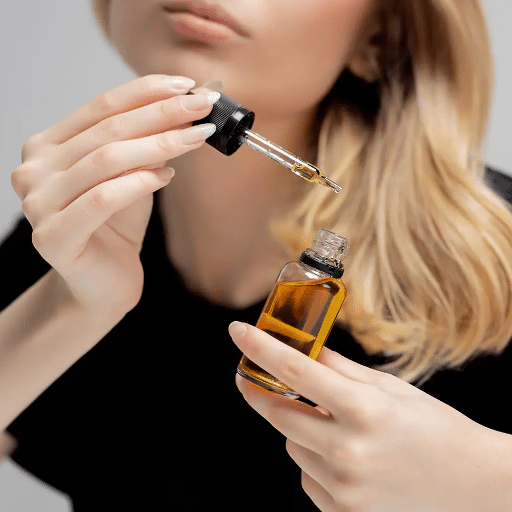
The diet is an essential factor in hair health. A diet that has a balance of all the essential nutrients helps the hair to grow, strengthens it, and also makes it glossy. The primary nutrients are:
Malnutrition with a deficiency of these particular minerals in the diet eventually leads to dry, thinning, and falling hair. To keep hair in the best condition, one should have a diet rich in vitamins and minerals and eat a variety of foods.
One way to modify the diet for the good health of hair is to choose nutrient-rich foods. Try to eat a mixed diet of fresh, organic foods that are high in dietary fiber. The diet should include all the food categories in the proper proportions. As fruits and vegetables are a great source of antioxidants, vitamins, and minerals, it is necessary to eat them in abundance for cell repair and hair growth. Proteins like chicken, fish, eggs, and plant-based options such as lentils and chickpeas should be the majority to provide the amino acids necessary for hair strength and growth. Iron and biotin are the chief elements found in whole grains, so use whole grains as part of your diet to give additional hair fortification. Foods that are an excellent source of healthy fats like avocados and fatty fish can be eaten with nuts, seeds, and the other types of fish that are fatty. Dry scalp and no shine are no longer concerns if these sources are used. Water intake is as important as the food choices the body makes, as water helps blood flow to the scalp and ensures nutrients are delivered appropriately. This combination of foods and water indirectly influences the health of both the hair and body through the circulatory system.
Some vitamins are essential for hair growth and hair loss prevention. Biotin, or vitamin B7, is an example because it is required for the synthesis of keratin, the main protein in hair. Vitamin D is just as crucial since its shortage has been associated with hair thinning and loss. You can boost your vitamin D levels by taking fatty fish, eggs, and dairy products that have been fortified with it. Vitamin E can also be very beneficial. As a potent antioxidant, it can protect the scalp by eliminating oxidative stress. At the same time, increasing blood flow and providing vitamins will significantly aid in hair growth.
Minerals play the same critical role in the process of hair growth. Iron is an essential mineral that helps our bodies deliver oxygen to the follicles, creating red blood cells and consequently, promoting hair’s strength. Beef, pork, lamb, turkey, and chicken are examples of food that have clean and well-sourced iron, among others. Just by eating these lean meats, you will provide your body with more of the iron that it needs. Zinc is essential for overall health and skin maintenance, and it effectively repairs tissues, especially oil glands, to ensure the proper functioning of hair follicles. People often think that nuts are eaten to obtain more protein, but they are also a source of zinc. Boning up on information about the types of vitamins and minerals you need and their daily doses is a good idea, as it won’t be tough to include them in your diet once you become disciplined.
Hydration plays a key role in giving hair good health. It is assumed that hair strands consist of about 25% water, and when properly hydrated, the hair becomes elastic and firm. A well-hydrated body stands out as the hair shaft retains moisture, thus limiting broken hair and split ends. In contrast, dehydration can cause dry, lifeless, and unattractive hair. Hydrating by drinking the right amount of water daily, which is 8-10 cups for most adults, is not just about health; it also ensures the scalp is well-nourished, allowing hair to grow to its best possible length. Moreover, water-rich foods such as cucumbers, oranges, and watermelon can go the extra mile to support hydration levels and, consequently, make for healthy and luscious hair.
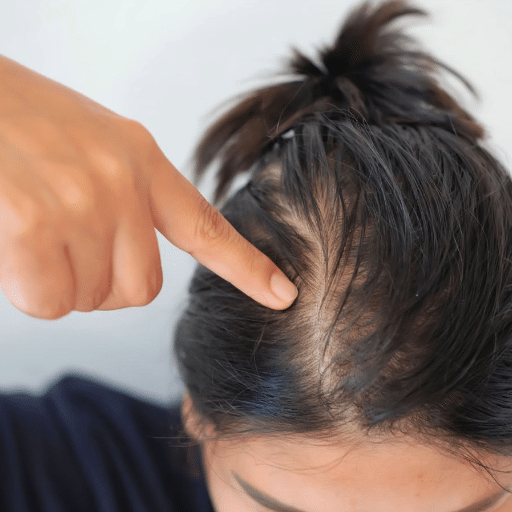
A meal plan that is well balanced in necessary components such as proteins, vitamins (for example, biotin, and vitamin D), and minerals (i.e, iron, and zinc), is essential for healthy hair regrowth. With the abundance of a variety of fruits, vegetables, lean proteins, and healthy fats, make sure you give your hair the needed nourishment.
A healthy scalp furthers the absorption of nutrients up to the hair. The more you do this, the cleaner and more nutritious your scalp will be, leading to better hair follicle health.
Prolonged stress could interrupt the way hair grows. A person should engage in relaxing activities, such as yoga, meditation, or exercise, to maintain hormone balance and prevent hair loss due to stress.
Select hair maintenance articles that are suitable for your type and specific hair needs. Say no to harsh compounds and explore therapeutic methods like minoxidil (under professional supervision) if the condition requires it, to support regrowth.
Hair growth anew is a slow and steady process that needs time and regularity of care. Stay on track with the course and seek advice from either a dermatologist or a trichologist for a more personalized approach.
A healthy scalp is crucial to encourage the growth of hair that is strong and promotes significant growth. One thing you can do is a regular cleansing, which will remove the buildup of excess oils, dead skin cells, and styling products that can clog hair follicles and even cause scalp problems. The health of the scalp can be improved by gently exfoliating it once or twice weekly, as this will promote better circulation and nutrient delivery to the hair follicles. The correct amount of hydration is very importan,t too—using scalp-friendly moisturizers or oils such as argan or coconut oil can shield your scalp and stop it from drying out and having any friction. Moreover, with a diet that contains many vitamin sources such as biotin, Vitamin D, and zinc, the scalp and hair will receive the necessary nutrients to be healthy and strong. From another angle, by not leaving out protection against the sun’s high-temperature rays, we can shield the scalp from the heat of hats or sunscreen and prevent damage. Thus, you will need to ensure that these behaviors are consistently undertaken, creating a conducive environment for hair to grow optimally.
In many cases, when hair loss remedies like drugs or creams do not work or give the expected results, having a hair transplant can be the ultimate solution. In general, patients for hair transplants are those with significant thinning or hair loss, attributed to causes such as a genetic predisposition to androgenetic alopecia. The procedure of hair transplantation involves removing hair follicles from donor sites where hair is dense, such as the back of the scalp, and implanting them into bald and thinning areas. This ensures that the results look very natural and last longer. Were it not for advanced techniques such as follicular unit extraction (FUE) and follicular unit transplantation (FUT), there would be a possibility of scarring due to the imprecision of the procedure. However, this aspect is now thoroughly addressed by a scarless and flawless process.
Recent data indicate that the satisfaction rate is high for those who undergo the operation, even though fewer than 90% of those likely to have it done are successful. But it is vital to have an evaluation by a dermatologist who can assess the age, density, health of the hair and head, and the extent of hair loss. These evaluations will not only help in deciding whether transplantation is the best option but will also guarantee that patients are not disappointed with the result.
URL: Read Study
Key Findings: The study investigated the effects of natural substances like castor oil, coconut oil, turmeric, and honey mixtures on keratin synthesis in hair follicles.
URL: Read Study
Key Findings: A combination of low-level laser therapy (LLLT) and growth factor infiltration therapy significantly improved hair density and thickness in a patient with androgen insensitivity syndrome.
To promote hair growth within three weeks, it is recommended to follow a hair care routine that includes oils and scalp treatments, which will steadily nourish the scalp and, in turn, promote hair growth. In this sense, the regular use of coconut oil can result in less hair fall and thicker hair. The hair mask, which should be applied at least once a week, should contain ingredients that nourish the scalp and support hair growth, like aloe vera or honey. The process of restoring your hair’s health can be as simple as drinking enough water and eating a balanced diet that meets your body’s mineral and vitamin needs; moreover, these two factors can also contribute to hair regrowth.
Hair loss is one of the common issues that can be a result of various factors, such as genetic and hormonal changes, among others. Deficiency in the body, poor health, and food habits being the top causes, are another contributor to hair loss. Some of them, you can manage. Symptoms that cause hair to drop are distress and nutrient deficiencies. One can avoid losing hair if there is constant tension and a lack of the right organic substance. Some treatments can be taken on the medical side, such as using essential oils and hair masks. For someone who is not responding well to these methods, one can always seek professional help to get a personal opinion on the matter, as well as explore different treatments that may lead to successful hair growth.
Indeed, hair can be regrown naturally through a proper plan. The essential use of natural oils like rosemary and coconut oil can boost hair growth and make the scalp healthier. Also, addressing the factors that cause hair loss in the first place, such as nutritional deficiencies or hormonal imbalances, is of great importance. Do-it-yourself treatments, combined with a well-balanced lifestyle, may lead to the regrowth of all hair. It is the hard work and perseverance of the individual that can make a difference in the success of hair regrowth, though different people may experience different outcomes.
To achieve thicker hair, you could consider adding oils such as coconut oil to your routine, as they can feed and build hair. Regularly massaging the scalp can help the blood flow, which in turn can be an excellent stimulant for hair growth. Eating food rich in vitamins, especially Biotin and Vitamin E, also has a positive effect on hair thickness. Avoiding excessive heat when styling or undergoing chemical treatments should be done to protect the hair from harm. The last thing is keeping the hair hydrated and managing stress, which can significantly impact the hair’s health and ultimately contribute to increased hair thickness over time.